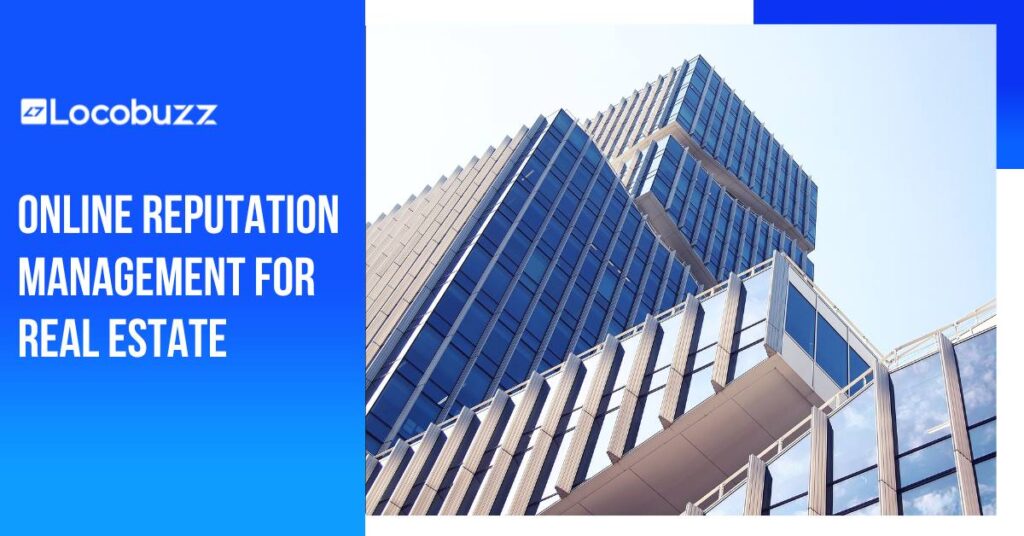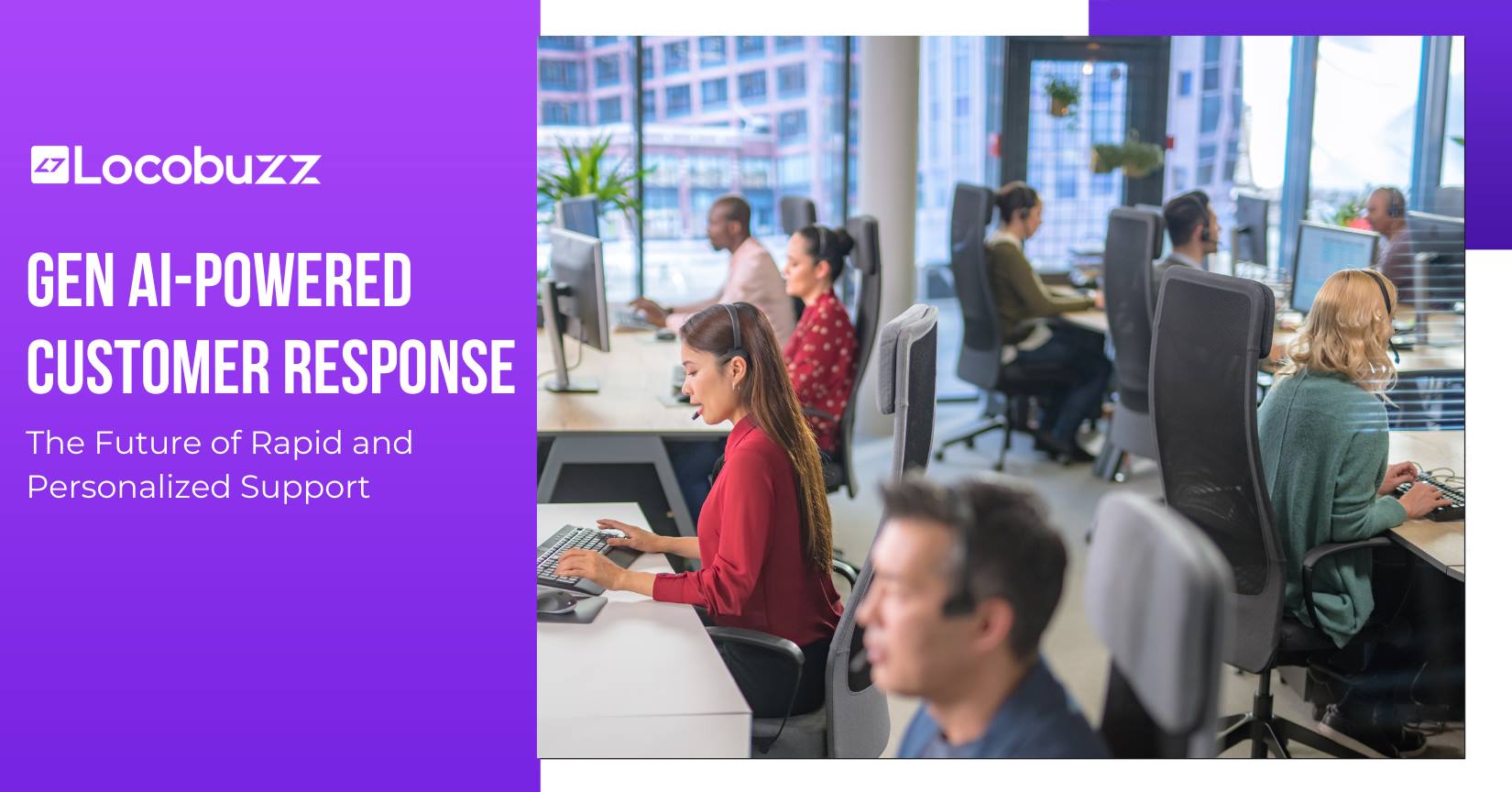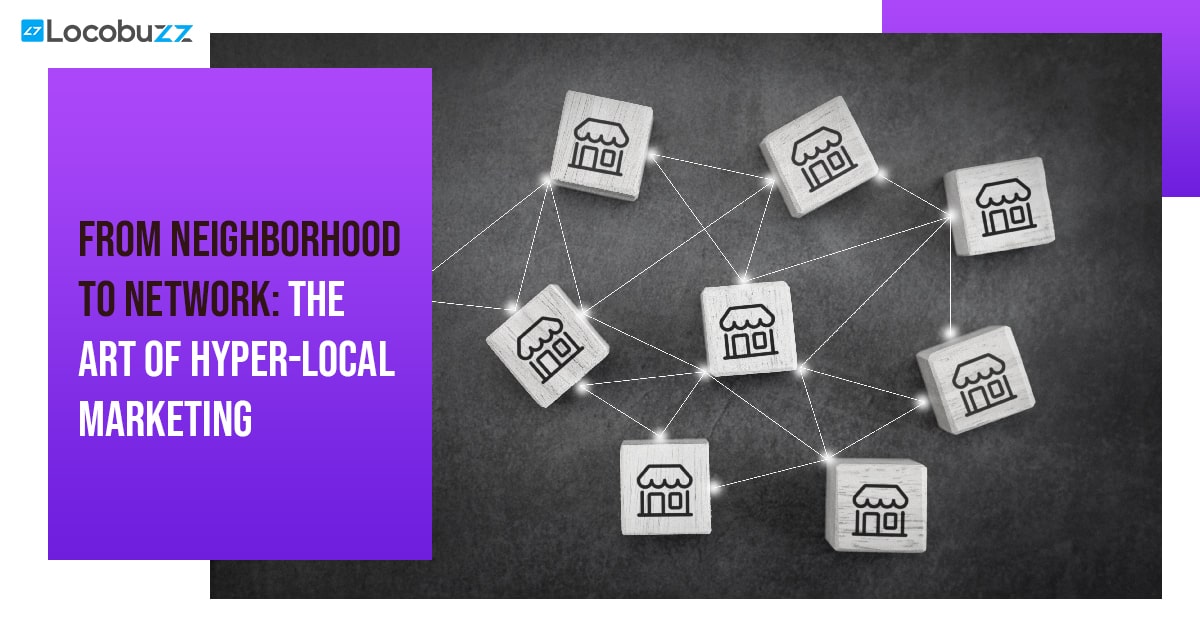Online reputation management for Real Estate

Maintaining a strong online reputation is crucial, especially in the real estate industry where technology plays a big role in property searches. Your online image is key in attracting potential clients. When you manage your online reputation well, you build credibility and stand out from the competition. Research indicates that most homebuyers start their search online, looking at listings, reviews, and agent profiles. This means your online presence is often their first impression of you. A positive online reputation can greatly impact their decision to work with you for their real estate needs.
Table of Contents
What is Online Reputation Management for Real Estate
Online reputation management for real estate is the process of monitoring how customers feel about your real estate business, taking strategic action based on the insights, and eventually influencing public perception by leveraging positive testimonials.
This is an ongoing process that every real estate business owner must invest in to grow their business and gain a significant edge over the competition. It involves actively monitoring and influencing how real estate professionals and properties are perceived online.
It includes strategies to maintain a positive image, handle negative reviews or comments effectively, and enhance visibility on digital platforms. Essentially, ORM for real estate aims to shape and protect the online reputation of agents, agencies, and properties to attract clients and build trust in the competitive real estate market.
Why is Online Reputation Management important for Real Estate
1. Reliability and Trust
In the past, people used to rely heavily on newspaper ads or recommendations from friends to find their perfect home. But today, the internet is the main tool for anyone starting their house hunt. There’s a wide range of online platforms like real estate websites and social media that offer tons of information for homebuyers. These platforms have detailed listings with descriptions, pictures, and even virtual tours of properties.
Plus, they make it easy to connect with real estate agents directly, so you can ask questions and get quick responses. Having positive reviews and ratings on these platforms is like having proof that you’re a reliable and trustworthy professional. On the flip side, if there are negative reviews or you’re not visible online, it could turn potential clients away. A good online reputation is like a magnet—it draws in homebuyers and makes them feel confident about working with you. When people see agents or agencies with a strong online presence and happy clients, they’re more likely to reach out and start a conversation.
This interest leads to more inquiries and, ultimately, more sales opportunities for real estate pros. And it’s not just about attracting new clients—having a positive online rep also encourages loyalty and repeat business. Satisfied clients are likely to leave positive reviews and recommend you to others, which boosts your credibility even more. It’s a cycle that keeps on giving, bringing in referrals and new business.
2. Positive and Negative reviews
Listening to clients’ suggestions for improvement is just as important as maintaining a stellar reputation. Real estate professionals need to show they’re committed to making their services better based on what clients say, creating a culture where client needs come first. Having a solid feedback system in place helps identify what the team is doing well and where they can improve.
Positive feedback tells the team they’re on the right track and gives them insights into what clients appreciate most. On the other hand, negative feedback is a chance to learn and grow, showing areas where they can do better in the future. By actively seeking and acting on client feedback, real estate pros prove they’re dedicated to making clients happy and are willing to go the extra mile. This proactive approach not only improves the client experience but also boosts the team’s reputation and builds lasting relationships with satisfied clients. Ultimately, paying attention to and acting on client feedback is crucial for providing exceptional service and building a loyal client base in the competitive real estate field.
3. Discovering Potential Clients
Being proactive about managing your online presence across different platforms—like social media, review sites, and search engines—can help you get noticed by potential clients. Regularly sharing engaging content, responding quickly to messages and reviews, and optimizing your profiles for search engines all contribute to boosting your online visibility. Platforms like Facebook, Instagram, and LinkedIn are great for showcasing your expertise, sharing property listings, and connecting with your audience.
By posting helpful content, sharing success stories, and joining relevant discussions, you can build credibility and attract followers who might become clients. Review sites such as Google My Business, Yelp, and Zillow are where clients often share their experiences with real estate professionals. By actively managing your presence on these sites—responding to reviews professionally and addressing any concerns—you show your dedication to customer satisfaction and improve your reputation. Search engine optimization (SEO) techniques are vital for improving your visibility in search engine results.
By using relevant keywords, creating quality content, and earning backlinks from reputable sources, you increase your chances of ranking higher in search results for relevant searches. Effectively managing your online reputation leads to more inquiries, leads, and business opportunities. When potential clients see your positive reviews, engaging social media posts, and informative content, they’re more likely to reach out for help with their real estate needs. So, a good online reputation not only protects your image but also helps you expand your reach in the digital world. By staying active across platforms and using SEO strategies, you can attract more clients and grow your real estate business in a competitive market.
4. Customer Experience Optimization
Online Reputation Management (ORM) involves more than just monitoring and responding to reviews—it’s about optimizing the customer experience. This means actively engaging with clients, soliciting feedback, and constantly improving their overall experience. One crucial aspect of customer experience optimization is engaging with clients at every touchpoint in their journey. Whether they contact you through email, phone calls, social media, or in-person, it’s important to be attentive and responsive to their needs.
Providing personalized assistance shows your dedication to meeting their expectations. Soliciting feedback from clients is also essential. Surveys, feedback forms, and direct conversations can all provide valuable insights into areas for improvement. By listening to their experiences and preferences, you can better tailor your services to meet their needs.
Addressing issues promptly is critical for maintaining satisfaction and loyalty. When clients encounter problems, it’s important to acknowledge their concerns, empathize with their frustrations, and take swift action to resolve the issues. This not only helps retain the individual relationship but also demonstrates your commitment to customer satisfaction to others. Finally, implementing constructive feedback completes the cycle of optimization. By listening to clients’ suggestions and making relevant changes to your processes or services, you show that you value their input and are committed to continuous improvement.
Discover how Locobuzz's ORM capabilities are transforming the Real Estate Industry
Effective Strategies for Real Estate Online Reputation Management
1. Optimize Online Profiles
Optimizing your online profiles across various platforms is essential for effective Online Reputation Management (ORM) in the real estate industry. Complete and accurate information is paramount to avoid confusion and frustration among potential clients. Maintaining consistent branding across all profiles reinforces your brand image and professionalism. By incorporating relevant keywords into your profiles, you improve your visibility in search engine results, attracting more organic traffic.
Compelling descriptions that highlight your unique value proposition can capture potential clients’ attention and set you apart from competitors. Optimizing for local search by including location-specific keywords helps attract clients in your target market. Regularly updating information and posting fresh content keep your profiles relevant and engaging. Furthermore, actively monitoring and responding to reviews demonstrates your commitment to client satisfaction, enhancing your reputation and attracting more clients. Overall, optimizing your online profiles ensures that your real estate business is easily discoverable and appealing to potential clients searching online for services like yours.
2. Content Creation
Blog posts and articles allow you to delve into various real estate topics in-depth, offering insights, analysis, and practical advice to your audience. You can cover a wide range of subjects, including market trends, home-buying tips, selling strategies, neighborhood profiles, and investment opportunities. By sharing valuable information, you demonstrate your knowledge and expertise, positioning yourself as a go-to authority for real estate-related inquiries.
Videos are an engaging and effective way to convey information and connect with your audience on a more personal level. You can create videos showcasing properties, providing virtual tours, offering expert advice, or sharing client testimonials. Video content allows you to showcase your personality and passion for real estate, helping you build rapport and trust with potential clients. Infographics are visually appealing and informative tools that can distill complex information into easily digestible visuals. You can create infographics to highlight market statistics, explain real estate processes, or showcase neighborhood amenities. By presenting information in a visually engaging format, you make it more accessible and memorable for your audience, increasing engagement and sharing potential.
The key to providing valuable content is to focus on addressing your audience’s needs, interests, and pain points. Offer practical tips, actionable advice, and insider insights that help your audience navigate the complexities of the real estate market. By providing genuine value, you build credibility and trust with your audience, establishing yourself as a reliable source of information and expertise.
3. Consistency across the platforms
Consistency in brand voice ensures that your messaging is cohesive and reflects your brand’s personality and values across all communication channels. Whether you’re posting on social media, sending emails, or interacting with clients in person, maintaining a consistent tone and style helps to establish a strong and recognizable brand identity. Consistency in messaging involves conveying a clear and unified message about your real estate business’s offerings, values, and unique selling points across all platforms.
Your messaging should be aligned with your brand’s mission and resonate with your target audience, reinforcing your brand’s positioning and value proposition. Visual consistency is equally important for reinforcing your brand image and identity. This includes using consistent colors, fonts, logos, and imagery across all online platforms and marketing materials. A visually cohesive brand identity helps to create a memorable and professional impression, making it easier for potential clients to recognize and remember your real estate business.
Consistency also helps to reinforce your brand’s visibility and recognition in the crowded digital landscape. When potential clients see consistent branding across multiple platforms, they are more likely to remember your real estate business and consider you when they are in need of your services.
4. Monitoring and Adapting
Regularly monitoring your online presence and reputation is essential to identify any emerging issues or opportunities. Use monitoring tools and analytics to track mentions of your brand, reviews, and social media interactions. Pay close attention to feedback from clients and keep a pulse on sentiment trends to detect any shifts in perception that may require intervention. Adaptability is key in ORM, as what works today may not be effective tomorrow.
Be prepared to pivot your strategies in response to changes in the online landscape or shifts in consumer behavior. Experiment with new approaches, content formats, or platforms to stay relevant and engage with your audience effectively. Maintain a proactive approach to managing your online reputation by addressing issues swiftly and taking advantage of opportunities to enhance your brand’s visibility and credibility.
Whether it’s responding to negative reviews, leveraging positive feedback, or capitalizing on trending topics, be proactive in shaping the narrative surrounding your real estate business. Ultimately, continuous monitoring and adaptation are essential components of effective ORM in real estate. By staying vigilant and adaptable, you can navigate the ever-evolving digital landscape with confidence, ensuring that your online reputation remains strong and resilient in the face of change.
Best Tool for ORM in Real Estate
Locobuzz
Utilizing a specific tool like Locobuzz for ORM in real estate can offer a range of benefits.Real estate is heavily influenced by brand reputation. Locobuzz can help real estate companies monitor and manage their online presence by tracking mentions across various platforms, including social media, forums, and review sites. This ongoing monitoring allows businesses to address issues promptly and maintain a positive image, which is crucial for attracting potential buyers and sellers.Locobuzz provides tools to engage with customers directly on social media platforms.
For real estate companies, this means they can respond to queries, thank clients for positive reviews, and address complaints quickly. This level of engagement not only helps in resolving issues but also boosts customer satisfaction and loyalty.Locobuzz offers analytics and insights about the audience, including demographic and psychographic data. Real estate companies can use this data to tailor their marketing campaigns more effectively, ensuring that they reach the right audience with the right message at the right time.
Locobuzz provides detailed reports and analytics on various aspects of ORM, such as sentiment analysis, reach, engagement, and more. These reports can help real estate companies measure the effectiveness of their ORM strategies and make data-driven decisions to improve their practices.
Conclusion
In conclusion, Online Reputation Management (ORM) remains a vital aspect for real estate professionals. With the increasing reliance on the internet for property searches, maintaining a positive online reputation is essential. By consistently monitoring and managing your online presence, ensuring uniformity across platforms, delivering valuable content, and adapting to changing trends, you strengthen your reputation in the competitive real estate market. A solid online reputation not only attracts potential clients but also fosters trust, credibility, and loyalty, driving the growth and success of your real estate business. Today, investing in effective ORM strategies is not just beneficial—it’s necessary for navigating and succeeding in real estate.






















